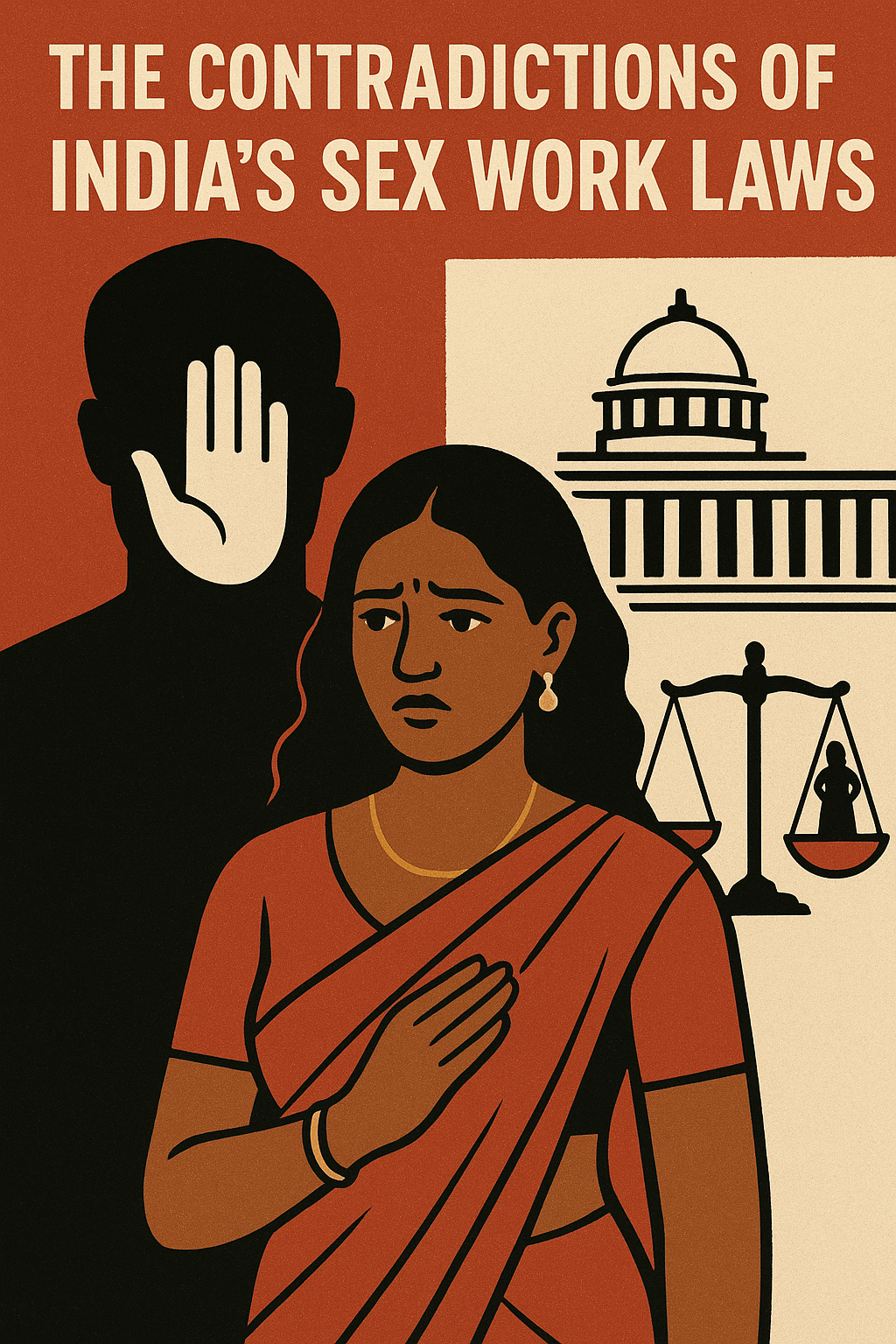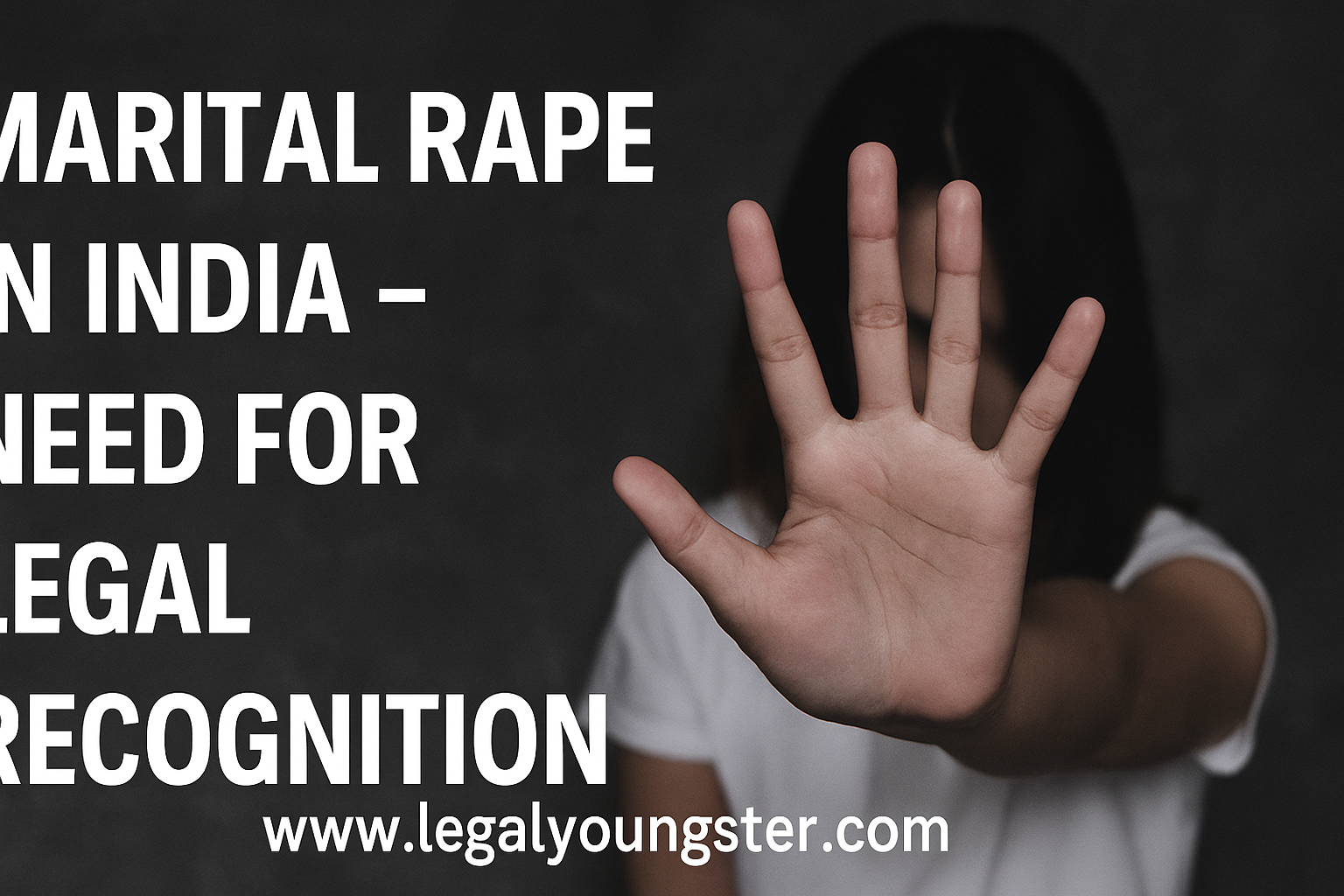



Author- Snehansh
Chandigarh Law College, CGC, Jhanjeri
Introduction
Marital rape, the insidious act of a spouse forcing sexual intercourse upon the other without consent, remains a deeply disturbing and largely unaddressed issue in India. While the global community increasingly recognizes and condemns all forms of sexual assault, Indian law presents a glaring exception, it only acknowledges marital rape as a crime if the wife is under 15 years of age. This means that forced sexual acts, including vaginal penetration, are not criminal offences under Indian law if the wife is above this arbitrary age limit. This legal lacuna creates a perilous loophole, effectively rendering marital rape one of the most hidden, pervasive, and unaddressed forms of violence within the nation.
Despite its severe violation of a person’s dignity, bodily autonomy, and fundamental rights, marital rape is not considered a criminal act in India. A United Nations report once indicated that nearly 75% of marital rape cases worldwide occur in India, highlighting the scale of the problem. Yet, the nation’s legal framework remains stubbornly silent on the issue.
What Is Marital Rape?
Marital rape fundamentally occurs when one spouse compels the other into any sexual activity without their free will. It is unequivocally an act of violence, a profound betrayal of trust, and a stark display of disrespect for an individual’s autonomy.
While India’s existing rape laws, enshrined in the Indian Penal Code (IPC), extend protection to unmarried women, married women are conspicuously excluded due to what is notoriously known as the “marital rape exception.” This problematic legal exception operates under the dangerous assumption that once a couple enters matrimony, the wife has permanently, irrevocably, and perpetually given consent to all future sexual relations within the marriage. Consequently, women who endure sexual violence at the hands of their husbands are tragically unable to seek justice through the regular criminal justice system that prosecutes rape.
This legal framework not only condones but effectively enables a form of violence that shatters lives, perpetuating a cycle of abuse within the supposed sanctuary of marriage.
Why Is Marital Rape Not a Crime in India?
The continued non-criminalisation of marital rape in India is a serious issue, rooted in outdated, patriarchal legal thinking and societal norms. Under the current interpretation of Indian law, if a man forces his wife (who is over the age of 15) to engage in sexual acts, it is explicitly not considered rape. This egregious exemption is predicated on a regressive assumption, that marriage automatically grants the husband an inherent, unconditional right over his wife’s body, neglecting her capacity to refuse sexual advances from her spouse.
This flawed mindset has condemned countless women to suffer in silence, stripping them of any legal recourse or hope for justice. Their profound pain, the humiliation they endure, and the deep-seated trauma they carry are invalidated by a legal system that simply dismisses the violence because it occurs within the confines of marriage. This stands as one of the most agonising and shameful truths of modern Indian society. The failure to acknowledge this reality not only perpetuates injustice but also undermines the fundamental human rights of millions of married women across the country.
Why Marital Rape Happens?
The pervasive nature of marital rape in India, and its continued social acceptance or silence, stems from a complex interplay of socio-cultural factors, systemic inequalities, and power dynamics.
1. Lack of Awareness and Education
A significant factor is the lack of awareness and comprehensive education regarding women’s rights, particularly the fundamental right to bodily autonomy and consent within marriage. Many women, especially in less educated communities, are simply not aware that they possess the right to refuse sexual advances, even from their husbands. Low literacy rate limits access to information and empowers knowledge. Without this basic understanding, it becomes difficult for women to recognise marital rape as a violation, let alone speak up, seek help, or demand justice. The societal narrative often emphasises a wife’s “duty” to her husband, further obscuring the concept of consent.
2. Cultural and Religious Norms
Deep-rooted cultural and religious norms play a powerful role in normalising the expectation of unquestioning sexual obedience from wives. In many Indian households, girls are raised with the pervasive belief that their primary role is to serve their husbands, which often extends to an implicit understanding of sexual availability. Religious teachings and centuries-old cultural expectations frequently reinforce the idea that sex is an inherent “obligation” in marriage, regardless of the woman’s personal wishes, desires, or physical and emotional state. This cultural conditioning creates an environment where women may feel morally or socially compelled to submit, even when they are unwilling, for fear of societal stigmatization, familial disapproval, or perceived religious transgression.
3. Power and Control
Beyond sexual desire, psychologists and sociologists extensively concur that marital rape is fundamentally an act of power and control. It is often less about sexual gratification and more about asserting dominance and subjugation. When a husband perceives a threat to his authority, masculinity, or control over his wife, he may resort to sexual violence as a weapon to re-establish his perceived dominance.
Types of Marital Rape
Marital rape is not a monolithic act, its manifestation can vary significantly depending on the underlying dynamics of abuse and the degree of coercion employed.
1. Force-Only Rape
In this type, the husband employs just enough force which can be physical, verbal, or psychological to compel the wife’s compliance without necessarily resorting to extensive physical violence. The force might be subtle, such as threats, intimidation, or persistent demands that wear down the wife’s resistance.
2. Battering Rape
In this form, the husband physically assaults his wife by beating her, slapping her, or inflicting other injuries and then forces her to have sex, sometimes immediately following or during the physical violence. In these cases, the rape serves not only as a means of sexual gratification but also as a definitive assertion of physical dominance and a profound expression of contempt and cruelty.
3. Obsessive or Sadistic Rape
This is the most extreme and disturbing form of marital rape, characterised by its intensely violent and often ritualistic nature. Here, the husband’s actions are driven by an obsession with sex, frequently coupled with a perverse sexual arousal derived from inflicting pain, humiliation, or torture upon his wife. The act is typically brutal, involving severe physical torture, mutilation, or degradation. Victims of obsessive or sadistic rape often suffer the most severe and enduring physical and psychological trauma, sometimes leading to permanent disfigurement or death.
When Are Women Most Vulnerable
Certain circumstances and power imbalances significantly heighten a woman’s vulnerability to marital rape, making it even harder for her to resist or seek help:
When the husband views the wife as property and not as an equal partner.
When the marriage is already characterised by physical abuse.
When the woman is pregnant or unwell, financially dependent and afraid to leave.
Effects of Marital Rape
Direct trauma: Victims frequently experience bruising, bleeding, and tearing in vaginal or anal areas due to the violent nature of the assault.
Severe physical harm: In the most brutal cases, victims may sustain broken bones, black eyes, nosebleeds, and deep cuts, indicating extreme physical violence beyond sexual assault.
Infections: Forced sexual acts, especially in unhygienic conditions or with a lack of care, significantly increase the risk of vaginal infections, pelvic inflammatory disease, and recurrent urinary tract infections.
Reproductive health issues: In severe cases, repeated trauma can lead to infertility or chronic bladder infections.
Mental health crises: Victims frequently experience intense fear, confusion, anxiety attacks, severe depression, and profound feelings of worthlessness and humiliation.
Suicidal thoughts: The overwhelming despair and sense of entrapment can lead to suicidal thoughts as a perceived escape from the unbearable pain.
Self-esteem and body image issues: The profound violation of their bodies often leads to severely low self-esteem, distorted body image, and a deep sense of shame and defilement.
Lack of Legal Recognition
The absence of legal recognition for marital rape in India is not merely an oversight but a deeply embedded problem reinforced by cultural, historical, and institutional barriers.
Cultural Barriers:
India’s social fabric has been historically shaped by deeply entrenched patriarchal values that prioritise male dominance within the institution of marriage. The deeply ingrained traditional image of the “pativrata” wife (a devoted and obedient spouse who unquestioningly serves her husband in all aspects, including sexually) has been a cornerstone of this cultural conditioning. The cultural narrative often conflates marriage with perpetual consent, effectively erasing a woman’s right to say no to her husband.
Outdated Legal Framework:
The core of the problem lies within Section 375 of the Indian Penal Code (IPC), which defines rape as sexual intercourse without a woman’s consent. However, this definition is tragically undermined by a crucial and controversial exception clause: “Sexual intercourse by a man with his wife, the wife not being under fifteen years of age, is not rape.” This outdated and discriminatory law effectively grants husbands, a “free pass” to compel sexual acts from their wives above the age of 15, leaving millions of married women fundamentally unprotected by the very law designed to prevent sexual assault.
“Private Matter” Mentality:
A powerful barrier to reform is the pervasive “private matter” mentality, where what transpires within a marriage is deemed sacrosanct and beyond the purview of external legal intervention. Many people, including a vocal segment of lawmakers and public figures, argue that criminalising marital rape would constitute an unwarranted intrusion into the sanctity of the institution of marriage. They express concerns that such a law would inevitably lead to a deluge of “false accusations”, which disrupt family harmony, and ultimately undermine the very foundation of marriage.
Barriers to Justice:
Even in countries where marital rape has been criminalised, conviction rates remain low due to the inherent difficulties in proving non-consensual sexual acts that occur in private. The profound fear of social stigma, the crushing weight of societal rejection, and immense family pressure often serve as obstacles, preventing women from reporting such deeply personal and traumatic cases. Furthermore, since there is rarely “proof” beyond the victim’s testimony “he said, she said” dilemma-many women are disheartened and refrain from pursuing legal recourse, feeling that their word alone will not stand against their husband’s denial in court. The very system often appears stacked against them, leaving them with little hope for genuine justice.
Conclusion
Marital rape is not just a personal violation it reflects a deep-rooted systemic failure of justice. By refusing to criminalise non-consensual sex within marriage, India implicitly legitimises gender-based violence and denies countless women the legal protection they are entitled to. Cultural, social, and legal obstacles may persist, but they cannot be allowed to overshadow a basic principle: marriage does not imply blanket consent.
Reforming the law is not solely about punishment it is about recognizing and upholding the fundamental dignity, autonomy, and rights of women. Criminalising marital rape is essential to breaking the hold of entrenched patriarchy embedded in both tradition and legal doctrine. The time has come for India to eliminate this outdated legal exception and affirm that justice, respect, and protection must extend to all women regardless of their marital status.
Reference –
https://www.google.com/amp/s/www.lawctopus.com/clatalogue/clat-pg/marital-rape-in-india/amp/
https://www.google.com/amp/s/www.thehindu.com/news/national/will-decide-constitutionality-of-exception-to-marital-rape-in-penal-law-supreme-court/article68764946.ece/amp/
https://papers.ssrn.com/sol3/papers.cfm?abstract_id=5180793
https://www.researchgate.net/publication/374449333_MARITAL_RAPE_IN_INDIA_-A_SOCIO-LEGAL_ANALYSIS
https://www.indialawjournal.org/archives/volume2/issue_2/article_by_priyanka.html
https://www.tscld.com/marital-rape-india-criminal-justice-reform